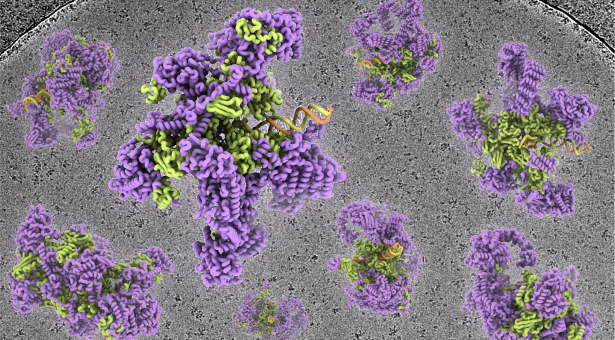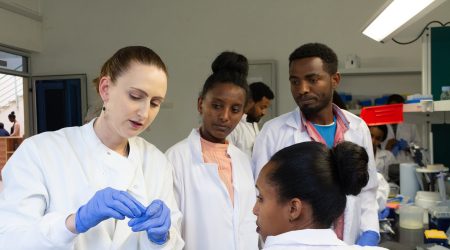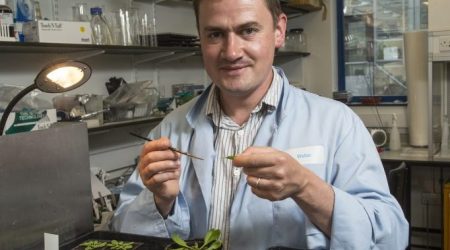Future Leader Fellowship will take photosynthesis research in an exciting new direction

Dr Michael Webster has been awarded a UKRI Future Leader Fellowship, a prestigious award that will enable his group at the John Innes Centre to take their research into the molecular workings of photosynthesis and genes in an exciting new direction.
Dr Webster, a group leader, was recently named among 75 promising research leaders who will benefit from the £101m UKRI fellowship fund aimed at tackling major global challenges and helping to commercialise innovations from research in the UK.
The Webster group’s research seeks to understand how plants produce photosynthetic proteins by visualizing the structures and biochemical activities of the complex molecules in the chloroplast.
Gene expression in the chloroplast is unique, which is due to its fascinating evolutionary history. The ancestor of the chloroplast was a free-living bacterium that was engulfed by another cell. Once inside, the bacterial cell gave its host the ability to perform photosynthesis, and a genome that encodes for the photosynthetic proteins. Intimate cooperation between the chloroplast and nucleus is needed for the plant cell to read these genes and make new photosynthetic proteins.
This cooperation is achieved in a remarkable way: molecular assemblies that resemble those of the bacterial ancestor are augmented by components that are encoded in the plant nucleus. Amazingly, these distantly related proteins have evolved to work together so that the plant cell can both support and control the use of chloroplast genes. There are a lot of open questions about how exactly this happens.
With the support of the UKRI Future Leader Fellowship, the Webster group will examine the first stage in the production of photosynthetic proteins in the chloroplast. This process, known as transcription, involves the production of messenger RNA (mRNA) by the enzyme RNA polymerase. The presence of an RNA polymerase unique to the chloroplast was identified more than 50 years ago, but we still do not have a clear picture of how it works and how it is controlled as a plant develops and adapts to its environment.
Michael said: “I was delighted to learn that I have been awarded the Fellowship. I selected to research gene expression in the chloroplast because it is poorly understood, which is surprising given its significance to plant growth. However, this is a new direction of research for me. The positive feedback from the award committee and academic reviewers of my proposal shows that my view that this research direction is important is widely shared.”
Michael’s group will focus on three methods of visualising photosynthetic protein production.
- They will employ cryogenic electron microscopy (cryo-EM) to determine atomic models of the chloroplast RNA polymerase. This will be aided by biophysical and proteomic methods to understand its molecular composition.
- They will reconstitute transcription of chloroplast genes in a test tube using RNA polymerase purified from plants and additional protein factors that regulate its activity.
- Thirdly, they will analyse the effect that removing components of the transcription machinery has on the capacity of plants to develop and photosynthetic activity to be established.
A detailed understanding of chloroplast gene expression mechanisms is a foundation to developing plants that have improved photosynthetic capacity. Environmental stresses such as heat, drought and salinity impact the ability of plants to do photosynthesis. The insight into photosynthetic protein production that will come from this project is expected to produce innovative ideas to make crops more robust in a changing climate.
Michael continues: “Unlike a conventional research grant, this Fellowship award provides the flexible and lasting funding that my group will need to work on such a long-standing and difficult research question. I am very grateful to have been given the opportunity to undertake such exciting science. I am also grateful for the support of colleagues at John Innes Centre for their commitment to making the research achievable and supporting my Fellowship application.”
UKRI’s flagship Future Leaders Fellowships allow universities, institutes, and businesses to develop their most talented early career researchers and innovators and to attract new people to their organisations, including those from overseas.
UKRI Chief Executive, Professor Dame Ottoline Leyser, said: “UKRI’s Future Leaders Fellowships provide researchers and innovators with long-term support and training, giving them the freedom to explore adventurous new ideas, and to build dynamic careers that break down the boundaries between sectors and disciplines.”
Image Caption: An image of a purified sample of the molecular assembly that transcribe chloroplast genes taken with a cryogenic electron microscope is shown in the background. Atomic models of the molecule derived from these images are shown in the foreground and are coloured by the genome origin of the component: chloroplast genome (green) and plant nuclear genome (purple).



